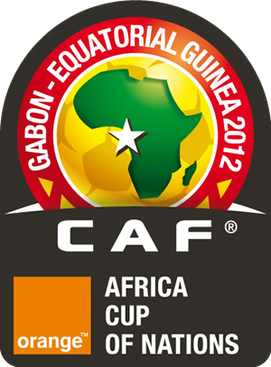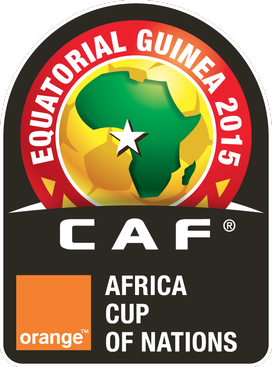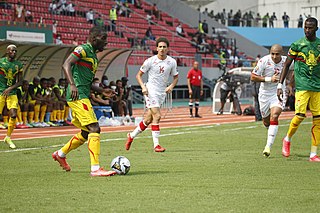
The 2010 Africa Cup of Nations, also known as the Orange Africa Cup of Nations for sponsorship reasons, was the 27th Africa Cup of Nations, the biennial football championship of Africa (CAF). It was held in Angola, where it began on 10 January 2010 and concluded on 31 January.

The 2012 Africa Cup of Nations, also known as the Orange Africa Cup of Nations for sponsorship reasons, was the 28th edition of the Africa Cup of Nations, the football championship of Africa organized by the Confederation of African Football (CAF).
The 2013 Africa Cup of Nations qualification was the qualification process for the 2013 Africa Cup of Nations, the 29th edition of the Africa Cup of Nations tournament. South Africa automatically qualified as the host country.

The 2015 Africa Cup of Nations, known as the Orange Africa Cup of Nations, Equatorial Guinea 2015 for sponsorship reasons, was the 30th staging of the Africa Cup of Nations, the international men's football championship of Africa. It was organized by the Confederation of African Football (CAF) and was held from 17 January to 8 February 2015.
The 2012 African Women's Championship was a football competition, which was organized by the Confederation of African Football (CAF). The final tournament was held in from 28 October to 11 November in Equatorial Guinea.
Group A of the 2012 Africa Cup of Nations ran from 21 January until 29 January. It consisted of Equatorial Guinea, Libya, Senegal and Zambia. The matches were held at Equatorial Guinea. Zambia and Equatorial Guinea progressed to the quarterfinals.
Group B of the 2012 Africa Cup of Nations ran from 22 January until 30 January. It consisted of Angola, Burkina Faso, Ivory Coast and Sudan. The matches were held in Equatorial Guinea. Ivory Coast and Sudan progressed to the quarterfinals.

The 2019 Africa Cup of Nations, known as the Total2019 Africa Cup of Nations for sponsorship reasons, was the 32nd edition of the Africa Cup of Nations, the biennial international men's football championship of Africa organized by the Confederation of African Football (CAF). The tournament was hosted by Egypt. The competition was held from 21 June to 19 July 2019, as per the decision of the CAF Executive Committee on 20 July 2017 to move the Africa Cup of Nations from January/February to June/July for the first time. It was also the first Africa Cup of Nations expanded from 16 to 24 teams.
The 2014–15 season will be the 54th season of competitive association football in Algeria.
Group A of the 2015 Africa Cup of Nations was played from 17 January until 25 January in Equatorial Guinea. The group consisted of the hosts Equatorial Guinea, Burkina Faso, Gabon, and Congo. Congo and Equatorial Guinea advanced as group winners and runners-up respectively, while Gabon and Burkina Faso were eliminated.
Group B of the 2015 Africa Cup of Nations was played from 18 January until 26 January in Equatorial Guinea. The group consisted of Zambia, Tunisia, Cape Verde, and DR Congo. Tunisia and DR Congo advanced as group winners and runners-up respectively, while Cape Verde and Zambia were eliminated.
Group C of the 2015 Africa Cup of Nations was played from 19 January until 27 January in Equatorial Guinea. The group consisted of Ghana, Algeria, South Africa, and Senegal. Ghana and Algeria advanced as group winners and runners-up respectively, while Senegal and South Africa were eliminated.
The knockout stage of the 2015 Africa Cup of Nations was the second and final stage of the competition, following the group stage. It began on 31 January with the round of 16 and ended on 8 February 2015 with the final held at the Estadio de Bata in Bata. A total of 8 teams advanced to the knockout stage to compete in a single-elimination style tournament.

The 2015 Africa Cup of Nations final was a football match that took place on 8 February 2015 to determine the winner of the 2015 Africa Cup of Nations, the football championship of Africa organised by the Confederation of African Football (CAF). The match was held at the Estadio de Bata in Bata, Equatorial Guinea, and was contested by Ghana and Ivory Coast. Ghana reached the final by winning their qualifying group and then defeating Guinea and Equatorial Guinea in the quarter-final and semi-final. Ivory Coast also qualified as group winners, after which they beat Algeria and the Democratic Republic of the Congo.
The Algerian team in its 57th year will participate in the Africa Cup of Nations for the 18th and fourth consecutive time.
Group A of the 2023 Africa Cup of Nations took place from 13 to 22 January 2024. The group consisted of hosts Ivory Coast, Guinea-Bissau, Nigeria, and Equatorial Guinea.

Tunisia has participated in the Africa Cup of Nations 21 times, and holds the record for the number of consecutive participations with 16 times, as the team has not been absent from the competition since the 1994 edition on its home soil. The first participation was in the 1962 edition in Ethiopia. He played his first match on 14 January 1962 and lost to the host country team 2–4 in the semi-final. However, Tunisia beat Uganda 3–0 in the third place match to win the bronze medal. Tunisia hosted the event for the first time during the 1965 edition, where the team reached the final and lost to the defending champions Ghana 0–2 after extra time to add the silver medal.
Ghana is one of Africa's major forces in the Africa Cup of Nations. Ghana made its debut in 1963, and quickly emerged as a powerful team in the tournament and went on to win the tournament again in 1965, 1978 and in 1982, which was the last tournament to date Ghana has won.
Cameroon are one of Africa's major forces in the Africa Cup of Nations. Cameroon won its first tournament in 1984, Cameroon emerged and became a fearsome power of the tournament, winning the tournament again in 2000 and 2002.
Ivory Coast is one of Africa's major forces in the Africa Cup of Nations. Ivory Coast has won the tournament three times, most recently as hosts in 2023. They previously won in 1992 and 2015. Ivory Coast has also finished as runner up twice, in 2006 and 2012.











